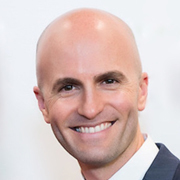
Dave Cameron
Dave Cameron began to explore his creative talents while at St Peter's College in Auckland. "I did a bit of art and photography," he says. "School was traditional, but laced with artistic stuff. I was inspired by the creative subjects — I decided I wanted to follow that, and chase that dream."
He went on to enrol at Auckland University of Technology for his Bachelor of Communication Studies. "At the time I wanted to be part of the music world. I wanted to be a radio DJ. I thought that would be a super cool job. My degree allowed me to explore different components of communication and creativity. I really enjoyed it and I found myself gravitating towards the image-making side of things."
While studying, Cameron got a summer job at Zee Films. After graduation, he joined Zee full-time and got his big break when the cameraman for Richard Riddiford's 1999 documentary Old Money put his back out, on the first day of the shoot. "Richard said to me 'guess you’re doing this now?' I bumbled my way through it. It was exciting and nerve-wracking." Cameron found himself swotting up on camera operating, in-between bouts of food poisoning in the South Island.
Then Cameron was offered a camera trainee position on Shortland Street. He recalls "the big set excitement" of working on a regular show. In 1999 his trial six-month contract was extended into a full-time job. "Fate and good luck gave me experience as a camera operator", he says. "I was constantly telling stories through a lens for the next two-and-a-half-years."
During his big OE, Cameron spent time in Canada on a working visa, Cameron picked up new skills working on varied low budget shoots. "That's where I really started learning about lighting". After a chance catch up in a studio hallway, Toronto-based cinematographer Duraid Munajim (Zero Dark Thirty) offered him a gig: the next day Cameron took a train to New York to join Munajim on short film Lower East Side Stories, as the gaffer. Although such projects were often paid on an expenses only basis, they provided great training for what was to come, once he was back in New Zealand.
In 2003 Cameron got another big break. "I was the director of photography for the second series of Secret Agent Men. At first, I questioned if I was ready for it, but I had people who believed in me. I worked day after day with lighting and filming on set."
In 2008 Cameron worked on children’s adventure series Amazing Extraordinary Friends, where over two seasons he "continued to cut my teeth with lighting and storytelling". For this work he received his first major nomination — for Best Cinematography for a Comedy/Drama Series at the Qantas Film and TV Awards.
Then director Fiona Samuel began working with Cameron, on adoption drama Piece of My Heart. "Working on this telefeature made me feel like I was a real cinematographer. There were lots of cast, heavier scenes and bigger budgets. Fiona and I had more time to consider each scene in pre-production."
In the same year, Cameron began shooting for South Pacific Pictures, including a number of high-profile drama series, such as Go Girls and Nothing Trivial. "I also worked on some mad comedy shows elsewhere: Agent Anna, A Night at the Classic and Hounds. Variety is good. It keeps your brain firing — it keeps you fresh."
For Cameron, the relationship between the camera and the actors is of particular importance. "I love the creative side of telling stories through a lens. The placement of a camera or how you move it enhances what actors do. One of the biggest joys of being a cinematographer is the proximity you get to the performance, to the actors, and to the moment that they are giving you."
Cameron has won awards thanks to a run of telefeatures, such as Fiona Samuel's Bliss – The Beginning of Katherine Mansfield (2013), The Monster of Mangatiti (2016), Resolve (2017), Pike River (2017), In A Flash (2018) and Ablaze (2020). There have also been accolades for legal series Dear Murderer and web series INSiDE, which won him Best Cinematography at a Canadian web fest — and two award-winning shows shot in Australia: comedy Sammy J and Randy in Rickett's Lane, and teen drama Nowhere Boys.
Cameron reflects on these projects and how they've shaped his work. "The projects I've worked on are all part of the tapestry of who I am as a cinematographer. I love the people I work with: you find these wonderful humans who are unusual, gentle, creative, and kind. They grapple with how to pay the rent or mortgages. But they love telling stories."
Crime series The Gulf — for which he has scored awards in Asia, and was named the NZ Cinematographers Society's 2021 Cinematographer of the Year — felt particularly gratifying. "As a creative project it's quite special to me. The producers, Paula Boock and Donna Malane, put a premium on the storytelling. They gave us lots of time in pre-production to think about the visuals."
Cameron also sings high praise for his collaborators, who give him the inspiration to tell stories. “One of the things that strikes me every day is the calibre of the people I get to work with — the visionary directors, the actors who are such special, magical creatures, and the crew, who are so committed to supporting what you do, and try to turn the dreams you and the directors have in your head into reality. That amazing whānau that gets created every time you put a project together is what keeps me coming back."
Profile written by Jane Ross: published on 30 May 2022
Sources include
Dave Cameron
Dave Cameron website. Accessed 30 May 2022
'Dave Cameron' LinkedIn website. Accessed 30 May 2022